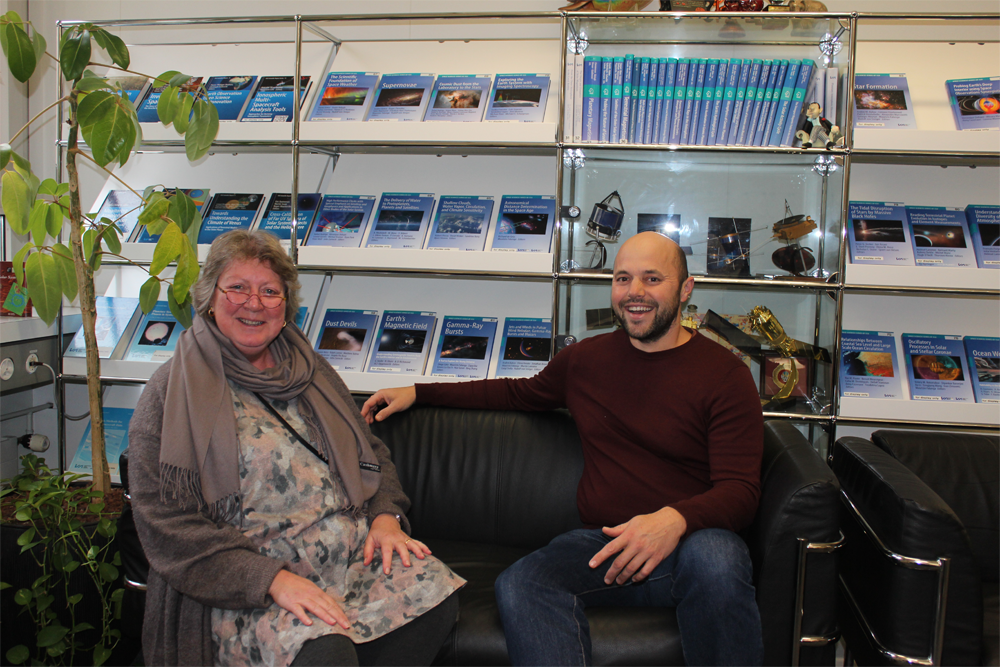Sandra Chapman’s early work on nonlinear plasmas was recognised with the COSPAR Zeldovich Medal (commission D) and the EGS Young Scientists’ Medal. She was selected to give the 2014 Royal Astronomical Society James Dungey Lecture and the 2020 Ed Lorenz Lecture at the Fall meeting of the American Geophysical Union. Sandra is part of a team awarded a 2021 Lloyd’s of London Science of Risk Prize. She has been awarded the 2022 Royal Astronomical Society Chapman Medal and the 2024 Johannes Alfvén Medal of the European Geosciences Union. In the following paragraphs she answers a few questions – asked by Roland Hohensinn, ISSI Post Doc – about her research. Roland Hohensinn is postdoctoral fellow in Earth Sciences and Data scientist. He does research on uncertainty quantification from satellite remote sensing data, with a focus on space geodetic techniques (GRACE/GRACE-FO terrestrial water storage, long-term GPS ground motions).
Roland Hohensinn: Sandra, please explain us the beauty of your science.
Sandra Chapman: I have been privileged to be able to work across a variety of topics under the general heading of ‘plasma physics’. Plasmas are not only ubiquitous in the universe, they are also fundamentally non-linear and, in space and astrophysical systems particularly, are far from equilibrium. So our study of plasma physics touches upon some of the deepest physics questions- how does entropy increase in a collisionless plasma? How do we go from physics which on the microscale is reversible, but on the macroscale, irreversible, without collisional dissipation? How are particles accelerated, how do energy and momentum flow between fields and particles?
The models and mind-pictures that we use are based on the equations of Maxwell, Lorentz, Liouville et al, and these are fundamentally beautiful in their structure and expression. I am a great fan of ‘the truth is usually beautiful’ approach to physics.

Sandra Chapman, Johannes Geiss Fellow 2023, and Roland Hohensinn, ISSI Post Doc
Roland Hohensinn: Which transformations you see your field undergoing at the moment?
Sandra Chapman: Thinking about space plasma physics, I think this is a particularly exciting, and challenging time. When I was beginning my physics career, the norm was to have access to the data from a single satellite and to look in detail at single time-series, perhaps to try some conjugate study with ground based observations or a second satellite. Plasma simulations were highly restricted in dimension and could only capture one physical scale of interest. Now we are in a data-rich era with imaging, multiple satellites and hundreds of ground based observations, all at unprecedented spatial and temporal resolution, but these observations are not homogeneous. Alongside this, we now have the capability to build and run computer simulations which evolve the fully non-linear plasma physics across multiple physical space and timescales. We need to think of new ways to extract, visualize, interrogate and compare the relevant information from this data, both from observations and simulations. There are many new tools for this that are well-established in other fields: networks, machine learning, AI, but the critical first step in this process is in formulating the physics questions to be asked of the data and building this into the analysis pathway, otherwise it is ‘garbage in, garbage out’. I don’t think that human physicists will be out of a job anytime soon!
Roland Hohensinn: How do you see the current and future role of ISSI in space sciences?
Sandra Chapman: It is one of life’s ironies that the more a science career progresses, the less time there is available to actually do science. So institutes like ISSI are an invaluable refuge that combine time to think, with opportunities to discuss. Physics has no borders and space science in particular is intrinsically international. ISSI in particular offers the flexibility to co-ordinate international teams on new topics. The ways in which we communicate our science, to each other, and to the wider public, are also changing rapidly and ISSI I think is well positioned to play a key role in this.
The Johannes Geiss Fellowship (JGF) is established to attract to ISSI – for limited duration visits – international scientists of stature, who can make demonstrable contributions to the ISSI mission and increase ISSI’s stature by their presence and by doing so will honor Johannes Geiss for his founding of ISSI and his contributions to ISSI, and for his many contributions to a broad range of space science disciplines.


